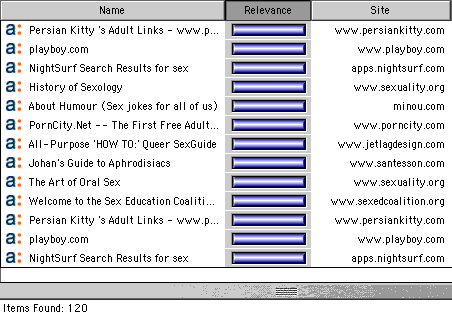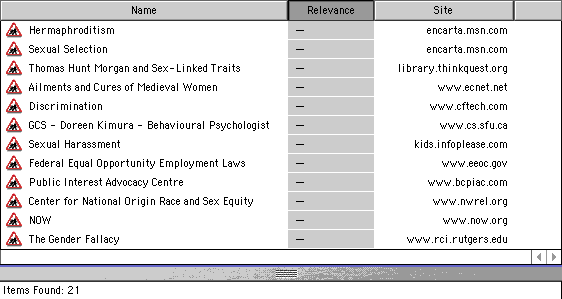
Is the Internet a scary place?
Exploring the Internet is a lot like wandering around in a big city. There are some neighborhoods that you will probably want to avoid. Can you find trouble online? Absolutely. Since the Internet is interactive, it is potentially much more dangerous than TV. Kids can very easily enter chat rooms and contact people they don't know. It's a good idea to supervise kids as you would when they are out in public or answering the phone when a stranger calls. I don't mean to say that the Internet is inherently dangerous. There are a variety of programs that filter internet content to make it safer for use in schools or in homes with children. CyberSitter, NetNanny, Bess, Websense, SmartFilter and Apple Computer's KidSafe are just a few that you might consider. There's a lot that makes the Internet worth the risks. You can find other people who share your interests, download software, do research, stay in touch with distant friends, or shop from your home. It's cool!
The need for filtering
Have you ever noticed what happens if you try to search the Internet for something related to gender, or sexual discrimination, or breast cancer, or if you happen to use the word "girl" in a search phrase? A search with the word "sex" in your subject line will generally get you something like this... Oh my goodness. Perhaps not what you had in mind for your 3rd graders? Clearly, there is a need for content filtering in the classroom.

The problems with filters
Problem #1: Most content filtering schemes use a blacklist. This means that the urls of web pages with objectionable words or topics are catalogued, and requests to visit these urls are blocked by the filter. This is a losing battle because naughty websites frequently change names to avoid the filters and new inappropriate material is popping up all the time, so some is bound to slip through. Like a missile defense, it's hard to get 100% protection, and nothing less than 100% is tolerable.
Problem #2: Internet filters cast a broad net. Unfortunately, not all content filtering is done by people. Many systems use so-called "robots" (automated search programs) to do the searching but, because they can't use judgement, they just follow the rules arbitrarily. One example involves the word "sex". In biology and many other fields, there are legitimate web pages that discuss such decidedly non-controversial topics as sex expression, sex allocation, sexual dimorphism, sex roles in society, sexual stereotypes, etc. but the filters see the word "sex" and block the page. Ironically, these same "dumb" filters sometimes fail to block clearly inappropriate sites such as one that sold "bestiality paraphernalia" that turned up in a search on the biological field of "animal behavior"! Congress may soon pass a bill that cuts off funding to libraries and schools that don't use filters, yet most filtering software is still deeply flawed.
Problem #3: What one person finds objectionable another might not. Sex education, evolution, criticism of the government and hate speech all fall into the same category of "offensive to some" so we want to be careful about what gets filtered and why. Freedom of speech is important, but where do we draw the line? Should we adopt the "least common denominator" of offensiveness and ban everything to which objections are raised? The list of banned books is a good argument that we need a better strategy for dealing with this difficult problem.
The best idea for schools might be a program that uses a "whitelist", for lack of a better term. Teachers could create a list of sites that they would like students to visit and have the filter set to block all others. This would also prevent the inoffensive but distracting sites that students often wander into rather than getting their work done. Of course, the problem with a whitelist is that it allows visits only to known and approved sites so a searcher would miss any good sites that the filter isn't aware of. Perhaps it would be best if the program could have settings for whitelist on/off.
Apple came up with just such a system, and it's called "KidSafe". It comes free with OS9.
![]()
Now let's try that search again with Apple's "KidSafe" search tool, and the same search word "sex"...

Definitely an improvement. It's a smaller list, but the web page names suggest that the filter has done a pretty good job. The web sites look much more reputable as well. You would still want to monitor carefully what students are reading at these sites since this is a sensitive area and may even require parental consent forms in your school district (see your district's Acceptible Use Policy), but I think the two lists of search results illustrate the point. With the right kind of filtering, schools and libraries can provide access to the Internet without worrying about exposing children to all of the dark alleys and bad neighborhoods in cyberspace.